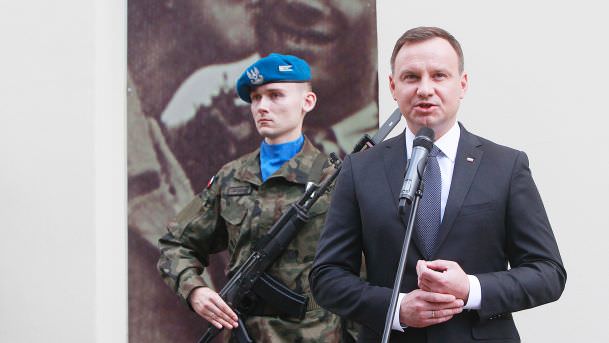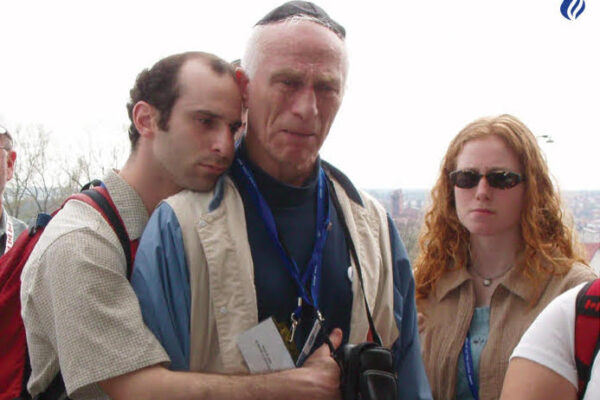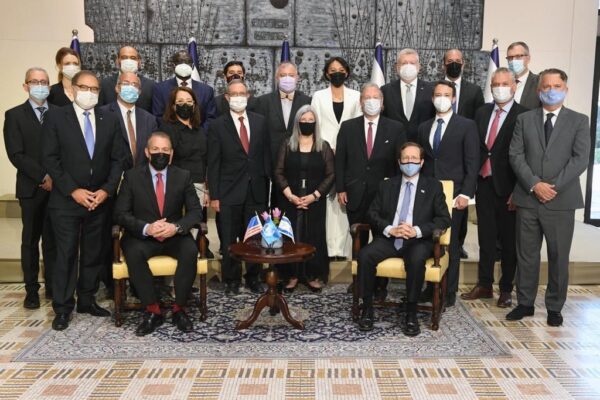
Poland’s President Andrzej Duda speaks during commemorations marking the 70th anniversary of a massacre of Jews in Kielce, Poland, July 4, 2016.
It was with disquietude and disbelief that I read Ofer Aderet’s report, “Yad Vashem Officials Slam Polish Government: ‘New Bill Is Very Close to Holocaust Denial’” (Haaretz, Aug. 24). It is unfortunate that the complex draft law approved by the Polish Council of Ministers on August 16 — which does not refer exclusively to the Holocaust — was the object of such simplistic and unfounded criticism. The gravest accusation, to Polish eyes, was that of Holocaust denial.
No attempt was made to understand the intentions of the framers of the bill, which are fully congruent with Polish diplomats’ efforts to eliminate from the global popular and media lexicon such historically misleading terms as “Polish death camp,” “Polish extermination camp” or “Polish concentration camp.” It should be noted that these efforts are supported by large Jewish organizations such as AJC (the former American Jewish Committee) and the Anti-Defamation League. These efforts should be seen as a tool in the battle against Holocaust denial worldwide, in accordance with the Working Definition of Holocaust Denial and Distortion adopted by the 31 member countries of the International Holocaust Remembrance Alliance on October 10, 2013. According to the Working Definition, distortion of the Holocaust refers, inter alia, to “attempts to blur the responsibility for the establishment of concentration and death camps devised and operated by Nazi Germany by putting blame on other nations or ethnic groups.”
Poland’s experience has confirmed the need to draw up and implement effective legal instruments aimed at countering falsification of the Polish history and protecting the good name of Poland and the Polish people. I wish to stress that these instruments are based on the European Union’s acquis communautaire, the total body of EU law, and specifically the Framework Decision on combating certain forms and expressions of racism and xenophobia by means of criminal law, adopted by the EU Council on November 28, 2008, as well as the case law of the European Court of Human Rights.
Remarks cited in the report demonstrate ignorance of the formulation of the bill that was approved by the Polish cabinet. The claim that foreign historians studying the Holocaust era in Poland under the Nazi occupation and the history of Jews in my country under Soviet totalitarianism after World War II completely contradicts the bill. The draft law unequivocally states that artistic and scientific activity is not subject to penalization.
With regard to the concerns raised by Aderet’s interlocutors regarding the interpretation of the results of historical research, particularly on the WWII period — which was tragic for Jews and Poles alike — I would like to mention a letter from Polish Prime Minister Beata Szydlo that was read out at a commemoration of the 70th anniversary of the Kielce pogrom: “There are many glorious chapters in the Polish history which should be mentioned with pride. Yet, one must also remember events that deserve condemnation.”
I do not contest the right to criticize and to express personal opinions, but I cannot agree with the baseless accusation of the Polish government with “Holocaust denial” or alleged attempts “to rewrite history.” Such accusations stand in contradiction to many initiatives in my country to preserve and commemorate centuries of Jewish heritage on Polish soil and the great Jewish contribution to enriching Polish culture. These initiatives include youth exchange and Holocaust education programs that are actively supported by the Ministry of Education.
As Ambassador of the Republic of Poland to the State of Israel, I would like to draw attention to the fact that Israeli-Polish ties grow stronger every year. Not only political or governmental relations, but also cooperation between organizations and between ordinary Poles and Israelis. To our delight, growing numbers of Israelis visit Poland, and vice versa. Is that the conduct of a state that strives to deny the Holocaust? Poland has often supported Israel, its right to exist and projects that aid in its development. It is fully cognizant of the challenges facing Israel and appreciative of its role in the region. I believe that strategic partners like Israel and Poland should avoid the use of such unhelpful claims in their discussions.
Jacek Chodorowicz is Poland’s Ambassador to Israel.
Originally published HERE








